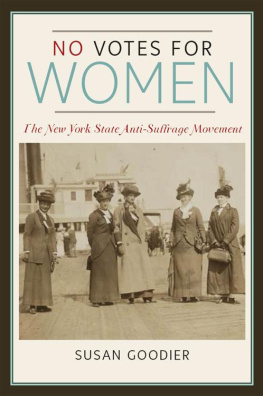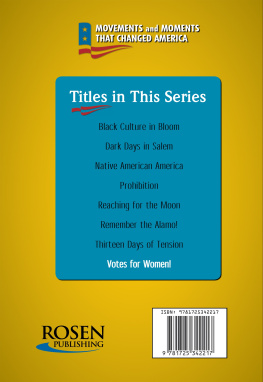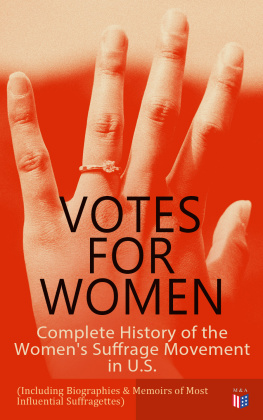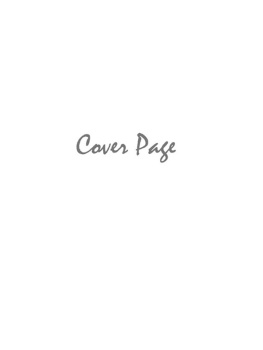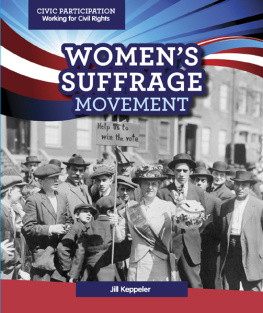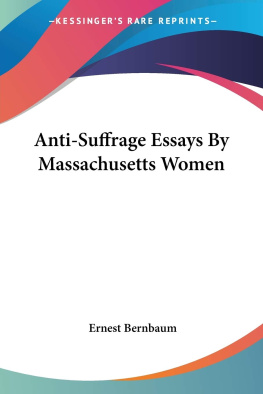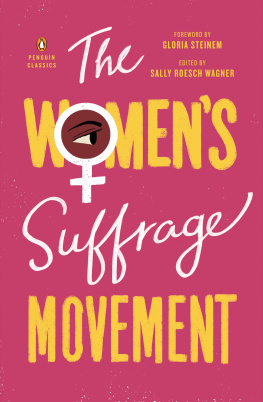Susan Goodier - No Votes for Women: The New York State Anti-Suffrage Movement
Here you can read online Susan Goodier - No Votes for Women: The New York State Anti-Suffrage Movement full text of the book (entire story) in english for free. Download pdf and epub, get meaning, cover and reviews about this ebook. year: 2012, publisher: University of Illinois Press, genre: Politics. Description of the work, (preface) as well as reviews are available. Best literature library LitArk.com created for fans of good reading and offers a wide selection of genres:
Romance novel
Science fiction
Adventure
Detective
Science
History
Home and family
Prose
Art
Politics
Computer
Non-fiction
Religion
Business
Children
Humor
Choose a favorite category and find really read worthwhile books. Enjoy immersion in the world of imagination, feel the emotions of the characters or learn something new for yourself, make an fascinating discovery.
- Book:No Votes for Women: The New York State Anti-Suffrage Movement
- Author:
- Publisher:University of Illinois Press
- Genre:
- Year:2012
- Rating:3 / 5
- Favourites:Add to favourites
- Your mark:
- 60
- 1
- 2
- 3
- 4
- 5
No Votes for Women: The New York State Anti-Suffrage Movement: summary, description and annotation
We offer to read an annotation, description, summary or preface (depends on what the author of the book "No Votes for Women: The New York State Anti-Suffrage Movement" wrote himself). If you haven't found the necessary information about the book — write in the comments, we will try to find it.
No Votes for Women: The New York State Anti-Suffrage Movement — read online for free the complete book (whole text) full work
Below is the text of the book, divided by pages. System saving the place of the last page read, allows you to conveniently read the book "No Votes for Women: The New York State Anti-Suffrage Movement" online for free, without having to search again every time where you left off. Put a bookmark, and you can go to the page where you finished reading at any time.
Font size:
Interval:
Bookmark:
WOMEN IN
AMERICAN HISTORY
Editorial Advisors:
Susan K. Cahn
Deborah Gray White
Anne Firor Scott,
Founding Editor Emerita
A list of books in the series appears
at the end of this book.
Anti-Suffrage Movement
2013 by the Board of Trustees
of the University of Illinois
All rights reserved
Manufactured in the United States of America
1 2 3 4 5 C P 5 4 3 2 1
 This book is printed on acid-free paper.
This book is printed on acid-free paper.
Library of Congress Cataloging-in-Publication Data
Goodier, Susan.
No votes for women : the New York state
anti-suffrage movement / Susan Goodier.
p. cm. (Women in American history)
Includes bibliographical references and index.
ISBN 9780252037474 (alk. paper)
ISBN 9780252078989 (pbk. : alk. paper)
ISBN 9780252094675 (e-book)
1. WomenSuffrageNew York (State)History.
2. Sex roleNew York (State)History.
3. New York (State)Politics and government18651950.
I. Title.
JK1911.N7G66 2012
324.6'2309747dc23 2012028167
This project began several years ago at the University at Albany. Richard F. Hamm, Iris Berger, Amy Murrell Taylor, all of the University at Albany History Department, and Sally Roesch Wagner, Executive Director of the Matilda Joslyn Gage Center in Fayetteville, New York, offered encouragement and support as well as professional vigilance over my work. They all continued to support my work in one way or another during the process of revising the material as a book. Other readers who have influenced me and helped me to clarify my ideas include Kristi Andersen of the Maxwell School of Syracuse University, Elisabeth Israels Perry of St. Louis University, Nancy Campbell of Rensselaer Polytechnic Institute, and Crista DeLuzio of Southern Methodist University.
I am especially grateful to Richard Hamm of the University at Albany, who read and critiqued every single rewritten chapter, and to Nancy Unger of Santa Clara University, who also read every chapter at least once. I am still amazed at the generous spirits of these two people. My writing group, the Rochester area United States History working-papers draft group (RUSH) critiqued one of the chapters, and I have benefited greatly from the input of members, including Alison Parker, John Daly, Jon-Paul Dyson, Peter Eisenstadt, Jennifer Lloyd, Megan Obourn, Dorinda Outram, and Diane Palmer. I am also especially grateful to my readers at the University of Illinois Press, Judy Wellman and Melanie Gustafson, for their constructive criticism. Each reader was diligent over my work, asking probing questions, challenging me to think more deeply and to ask myself bigger questions. I am well aware of how deeply I am in their collective debt. None of these people are responsible for any of my errors or omissions, of course, but the book is far better for having had their attention.
People at several academic institutions have been remarkably supportive in any number of ways. During a teaching appointment at Cazenovia College I benefited from the support of Judy Azzoto, Diane Carpenter, Stephanie Leeds, Grazyna Kozaczka, and Maryrose Eannace. Tim Hickey of Utica College helped in the search for obscure resources. I am particularly indebted to the staff at Burke Library at Hamilton College in Clinton, New York. I have benefitted from years of assistance from reference librarians such as Anne Nassar, Kristin Strohmeyer, Lynn Mayo, and Glynis Asu, as well as staff members Philip Gisondi and Cynthia McKelvey. Toward the end of my revising period, I received scholar-in-residence status at Hamilton College, which was just the encouragement and support I needed.
I have had the pleasure of working with some very fine assistance and support at various archives and historical societies. At Vassar College, Dean M. Rogers of Special Collections was very helpful, as was Colleen Mallet, Associate Registrar, and Eileen Witte of the Alumnae and Alumni Department. Mary Huth of the Department of Rare Books and Special Collections at the University of Rochester assisted me on several occasions. Sarah Katherine Gordon at the Kroch Library of Cornell University went out of her way to be helpful to me during and following my several days of research there. On two research trips to the Library of Congress, I was ably assisted by several very helpful and enthusiastic people, including Abby Yochelson, Sheridan Harvey (who admitted she is descended from the anti-suffragist Henry Stimson), and Janice Ruth. Rosemary Fry Plakas, then involved in the project to digitize the Miller suffrage scrapbooks, sent me digitized images she thought I should see. Diana Carey and Sarah Hutcheon assisted me at the Schlesinger Library. Sharon Cooney at the New York State Historic Site at Lorenzo in Cazenovia was a researchers dream. She let me know whenever she discovered yet another pile of anti-suffrage materials, let me read them before they were accessioned, and then made copies of all the pages I asked for. Sue Shutte at Ringwood State Park was extremely helpful in compiling materials on Sarah Amelia Hewitt. I would also like to thank Enid Mastrianni for generously sharing her extensive files and notes on Prestonia Mann Martin; Pat Blackler, the village historian at the Skaneateles Historical Society; the staffs of the New York State Library and Manuscripts and Special Collections division, and W. Douglas McCombs of the Albany Museum of History and Art. Volunteers at the Clinton Historical Society, Coline Jenkins of the Elizabeth Cady Stanton Trust, the staffs of the Cazenovia Public Library and the Guilford Free Library, as well as Erin Crissman, then at Historic Cherry Hill, all accommodated my requests for information.
My research was supported with several travel and research grants over the years as I studied the topic of womens anti-suffrage activity. The Gilder Lehrman Institute of American History supported a week of research at the New York Public Library. I was thrilled to be the recipient of a four-week fellowship at the Jacob Rader Marcus Center of the American Jewish Archives at Hebrew Union College in Cincinnati, Ohio, to research the extensive papers of Annie Nathan Meyer. Gary Zola, executive director, encouraged me to apply for the fellowship, and Kevin Proffitt was especially helpful to me. I also appreciated the excellent support of research assistants Camille Servizzi, Elise Nienaber, and Vicki Lipski. The Lilly Library of Indiana University at Bloomington gave me a two-week Helm Fellowship research grant to support me as I worked through the Gilder Collection. The staff there is excellent and very accommodating. I also received a travel grant to visit the Lou Henry Hoover papers at the Hoover Presidential Library in Long Branch, Iowa, where I was assisted by a friendly and helpful staff. In the summer of 2009 I had the distinct pleasure of a six-week Margaret Storrs Grierson Scholar-in-Residence Fellowship at the Sophia Smith Collection at Smith College. Sherrill Redmon, Amy Hague, Susan Barker, Karen Kukil, and other members of the staff encouraged my work, suggested additional sources, and applauded my progress. I am extremely grateful to Laurie Matheson, Editor-in-Chief at the University of Illinois Press, for encouraging me and believing in my work right from the beginning.
Anyone working on such an intense and time-consuming project must rely on friends and family to help get her through. I am especially grateful to Kerry Daly, Lauren Kozakiewicz, and Laura Wittern-Keller. My family offered support in the myriad ways families always support one of their own, sometimes listening for hours as I talked about anti-suffragists and their movement. Chris Anderson, knowing absolutely nothing about anti-suffrage when we met, is now nearly an expert on the topic. Most impressive of all, never having read Virginia Woolf, he consistently makes sure I have the best room in the house in which to write.
Font size:
Interval:
Bookmark:
Similar books «No Votes for Women: The New York State Anti-Suffrage Movement»
Look at similar books to No Votes for Women: The New York State Anti-Suffrage Movement. We have selected literature similar in name and meaning in the hope of providing readers with more options to find new, interesting, not yet read works.
Discussion, reviews of the book No Votes for Women: The New York State Anti-Suffrage Movement and just readers' own opinions. Leave your comments, write what you think about the work, its meaning or the main characters. Specify what exactly you liked and what you didn't like, and why you think so.

